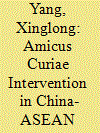| Srl | Item |
| 1 |
ID:
178418


|
|
|
|
|
| Summary/Abstract |
One main criticism levelled against the investor-state dispute settlement system (ISDS) is the existence of limited opportunities for amicus intervention. Against this backdrop, this article firstly studies what reforms regarding amicus intervention in ISDS proceedings have been put forward by China and ASEAN countries and the relevant dilemmas. Subsequently, to ensure that maximum benefits can be realised from amicus participation in ISDS proceedings in China-ASEAN Free Trade Area (CAFTA), this article proposes procedures for when and how an amicus may participate in arbitral proceedings under the upcoming investment agreements, particularly the Regional Comprehensive Economic Partnership (RCEP). Additionally, given the fact that the level of amicus participation in ISDS proceedings is still limited, the article suggests that China and ASEAN need to establish safeguards to provide amici with access to key arbitral documents and oral hearings. However, achieving the above objectives should not come at the expense of undermining the confidential and protected information of both disputing parties.
|
|
|
|
|
|
|
|
|
|
|
|
|
|
|
|
| 2 |
ID:
127790


|
|
|
|
|
| Publication |
2014.
|
| Summary/Abstract |
Interest groups often make their preferences known on cases before the U.S. Supreme Court via amicus curiae briefs. In evaluating the case and related arguments, we posit that judges take into account more than just the number of supporters for the liberal and conservative positions. Specifically, judges' decisions may also reflect the relative power of the groups. We use network position to measure interest group power in U.S. Supreme Court cases from 1946 to 2001. We find that the effect of interest group power is minimal in times of heavily advantaged cases. However, when the two sides of a case are approximately equal in the number of briefs, such power is a valuable signal to judges. We also show that justice ideology moderates the effect of liberal interest group power. The results corroborate previous findings on the influence of amicus curiae briefs and add a nuanced understanding of the conditions under which the quality and reputation of interest groups matter, not just the quantity.
|
|
|
|
|
|
|
|
|
|
|
|
|
|
|
|